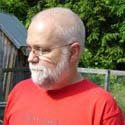I haven't abandoned the project. In fact, I have just reread the series of remarks in the 80s & will have some more to say about them tomorrow, after I have read through your comments.
"The sign-post is in order if--under normal circumstance, it fulfills its purpose." But there is no final & founded reality to be ascribed to the sign post.
Philosophical Investigations
Christopher Robinson & Joseph Duemer read Wittgenstein's Philosophical Investigations
7.24.2003
3.27.2003
Checking in again, Chris. Sorry to have let this dropped. As a poet, I have to believe that the actual leaf "is more real" than the abstracted leaf. I early on adopted Blake's hatred of abstraction. I'd argue that it's a species of abstraction that got our country into this stupid, bloody war in Iraq.
3.05.2003
Sidestepping Materialism & Idealism is one of the things that makes Wittgenstein so austere. I appreciate the rigor but let's talk about abstraction. When we ab-stract the general picture of all leaves the resulting image is certainly "real" & has an ontological relationship to a particular leaf. It is the nature of that relationship that interests me. Blake wrote that "genius is in minute particulars" & by genius I think he meant something like life. Am I only making a commonsense distinction between the abstract image & the particular object? I've always had the sense that the chair I'm sitting on as I type would hold my weight more effectively that Plato's Ideal Chair. In a few minutes I'm going to go crawl into a bed constructed of birch logs & snuggle down with a little terrier. When you say "virtual reality" do you mean something Platonic?
Let's do a thought-experiment. We're on the holodeck of the Enterprise & we call up a country scene with grass & trees & a path beside a river. Let's say we're walking with a terrier & a lab. I take it that you're suggesting that functionally (?) there ain't no difference between that place & my patch of South Colton where I walk my dogs. What is the relationship between the hologdogs & my specific dogs? Sorry if these questions smack of sophomore bull-sessions, but I want to get clear here & try to understand where Wittgenstein comes down on these essentially ontological questions.
3.03.2003
I went back last night & re-read all the remarks in the 70s & was struck by the example of the leaves. It is a problem I have posed to my own students when talking about Plato. In the fall, shortly after coming to Clarkson, I found myself walking with my old dog Mingo by the river & thinking about how to teach Plato's Euthyphro. I've long been troubled by the tendency of Idealism to erase the actual world. I'm something of an empiricist at heart, always have loved science . . . . So W's illustration of the leaves caught me more forcefully than that of the blurred picture. You could digitalize a million leaves of all kinds & program a computer to scan the outlines of all of them & produce a general figure. (I'd guess that you'd arrive at something vaguely ovoid.) But what would you know after such an exercise?
2.27.2003
"You got to walk that lonesome highway / you got to walk it by yourself." There's a whole cluster of folksongs & hymns that take up this theme of the individual confronted by meaningless nature. The solution, rejected by Wittgenstein, is usually some exterior force, a god or an ideology. And this leaves the traveller even more alone.
2.26.2003
All right, glad to see you back. For the moment just a brief response. I've been thinking about two sorts of things recently: 1) The way that what we call the self is a provisional & ongoing process & 2) the way the "personal" works in poetry. Particularly 20th+ century poetry.
The only one of your statements [79] that gives me any pause at all is the first one & then only because that information about your work with the dying is that it may not be common knowledge among your friends. To someone who does not know you very well, your statement would present problems of verification. Perhaps, in your humility, you don't make this practice of yours public.
As for the others, my wife is the most beautiful woman I have ever seen, but that doesn't mean I won't accept your statement. Both statements can be true. It is delimited by the first person pronoun. Anyone with a wife will know what you mean. (This turns out to be more interesting that I first thought.) In the case of bench pressing, I could, as you say, drag you to the gym & make you prove it, but there is also a common sense objection--you don't look like a weight lifter.
More anon.
2.03.2003
So how did analytic philosophy become post analytic? It certainly did not come about through the work of continental philosophers. They were mostly ignored and, by and large, were content to explore continental philosophy, rather than engage in criticisms of the mechanistic research programme. Hence the development of the analytic/continental divide. [Philosophy.com]

